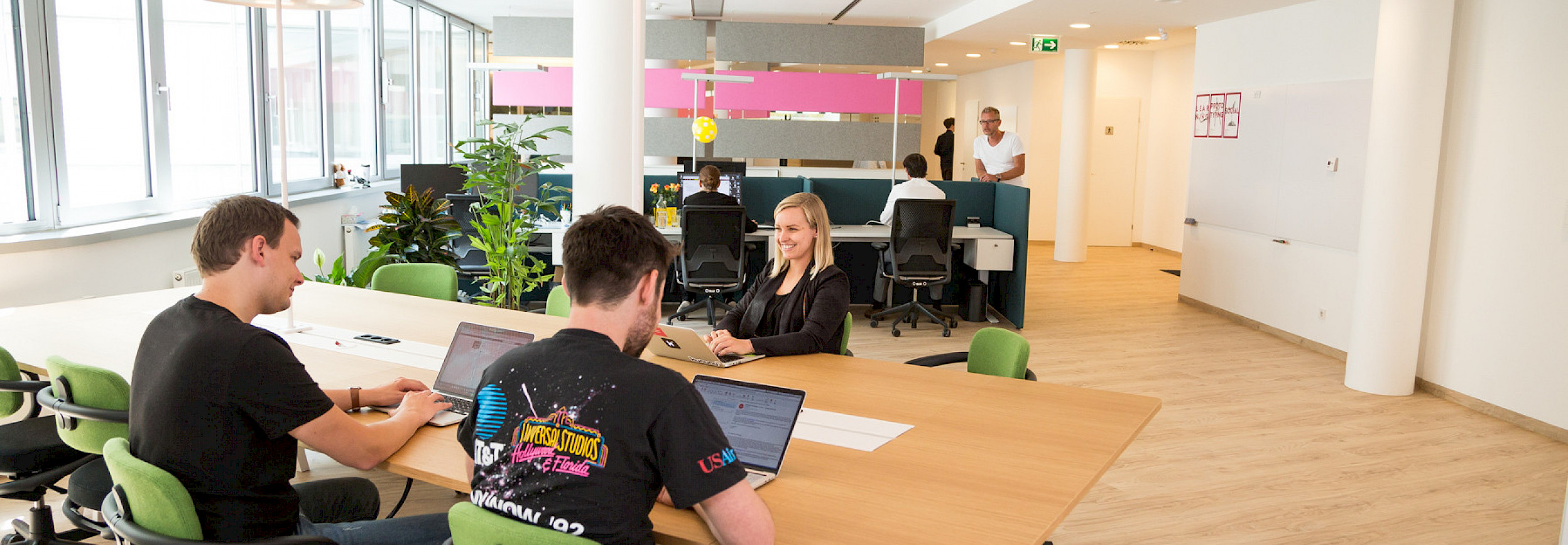The youngest generation of employees is self-confident. Its members are well educated and are the beneficiaries of demographic change. Unlike their predecessor generations, they will probably not have to do a whole series of internships in order to snag a coveted job. On the contrary, many members of this generation will be able to choose among multiple offers as they decide where they want to work. According to a survey of more than 2,000 representatives of Generation Z conducted by the Institut für Generationenforschung in Augsburg, this is also the opinion of the members of Generation Z themselves. Of course many young people are still unsure about their opportunities on the job market, but 42.5% of the survey’s respondents believe that their chances are either good or very good. Only 9.4% of them suspect that their entry into the job market could be difficult.
Profile of a generation
Generation Z comprises the people born between 1995 and 2010. They owe this name to their predecessor generations X and Y.
Rüdiger Maas, the head of the Institut für Generationenforschung, points to another designation that is often used in the USA: “Generation Snowflake”. This is due to the fact that the parents of Generation Z regard their children as unique, yet very fragile, creatures.
What’s different about them?
The study enables us to compare Generation Z and Generation Y in some respects. For example, there are hardly any differences between the two generations’ desire to develop their own capabilities. This desire is important for 57.3% of the representatives of Generation Z. When Generation Y was as old as the Zs are today, 59.8% of the Ys said that about themselves. There was also strong alignment between the two generations’ assessments of their own level of ambition. A total of 40.5% of the Zs called themselves ambitious. Almost 20 years ago, 37.2% of the Generation Y representatives said they were ambitious.


By contrast, there are huge differences between the two generations’ assessments of the importance of family relationships. At the start of their working lives, only 34.9% of the Generation Y representatives said that children and family life were important to them, but 68.7% of the Zs participating in the current study say this about themselves. The working world will have to adapt to this attitude. A total of 47.7% of the respondents from Generation Z would like to have a boundary between their professional and private lives. Only 10.1% of them can imagine mixing the two. However, this does not mean that the youngest employee generation would basically not get involved in a project outside their regular working hours. At the very least, 44.4% of the Zs can envision being accessible for their superiors outside their working hours. And 40.1% of them would read their work-related e‑mails even after work.
Expectations regarding the future workplace
Rüdiger Maas and his team also asked about the wishes for the workplace. At the top of the wish list is a pleasant working atmosphere. This is important for 88.4% of all respondents. Almost as important are interesting activities (84.1%), a secure professional status (77.6%), opportunities for continuing education (67.2%) and an easy physical access (65.0%). Good opportunities for promotion speak in favour of accepting a certain job for 63.5% of the respondents. Less important factores are a high income (48.7%) and—this is not necessarily a contradiction—lots of leisure time (35.3%).
The ideal work environment
And in what kind of environment would the representatives of Generation Z like to work? The team of the Institut für Generationenforschung headed by Rüdiger Maas recommends that companies emphasize teamwork and place the members of a team together in one room.

Informationen zur Studie
A study conducted by the Institut für Generationenforschung, Augsburg, published as:
Maas, Rüdiger (2019), Generation Z für Personaler und Führungskräfte – Ergebnisse der Generation-Thinking-Studie (Generation Z for HR personnel and managers—results of the Generation Thinking study). Munich, Hanser Fachbuchverlag 2019, ISBN 978–3‑446–46224‑3
The study was conducted in two phases. The basis of the study was a survey that used a structured questionnaire formulated in 2018. More than 2,000 “Zs” were recruited. The survey team found some of the respondents directly in educational institutions; other participants were informed about the survey via social media channels. Some of the questions were taken from a study conducted in 2002 by the German Youth Institute (DJI), Munich. This made it possible to compare the answers with those given by Generation Y respondents back then. The survey was conducted exclusively with individuals aged 16 or older. In order to explore these results in greater depth, a “Generation Thinking Workshop” was held. This workshop focused on the experiences of companies to which members of Generation Z had applied for jobs.
_____
Photography in this article: LeoPatrizi / iStock by Getty Images, AleksanderNakic / iStock by Getty Images, IBA (Photography at kununu GmbH, Vienna)




